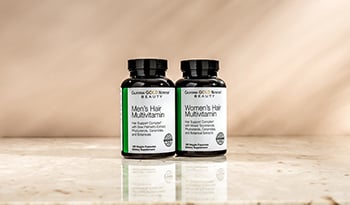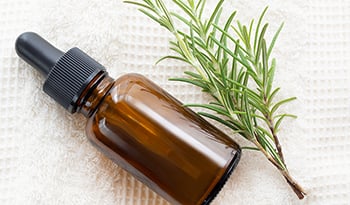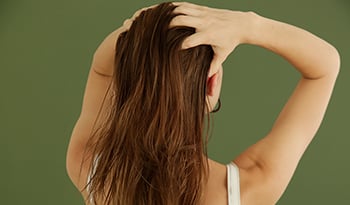How to Improve Hair Growth for Female Hair Loss

We’ve all been there—hair in the sink, clumps of hair falling out when we brush, or so much hair in the shower that it feels like we’re unclogging it every other week. But sometimes hair loss goes beyond normal hair shedding and crosses into a medical issue, resulting in thinning hair, bald spots on the scalp, or so little hair regrowth that we have to resort to scarves, wigs, or makeup to cover it. Thankfully, it doesn’t have to be this way!
Hair loss can feel scary if you don’t know what’s causing it or how to fix it. Luckily, there are a number of treatable causes of hair loss that your doctor can help you identify, and a wide variety of natural treatment approaches available for women who want to stop hair loss and regrow their luscious locks.
In this article, we’ll cover common causes of hair loss and how to fix them using natural approaches, lifestyle, supplements, and more.
Causes of Female Hair Loss
It’s normal to lose up to 100 hairs per day, and even more in the 2-4 months after major hormonal changes like birth, menopause, or pregnancy. But when hair loss increases beyond this, persists beyond a few weeks, or results in bald spots, it’s considered to be a symptom of an issue that needs to be diagnosed and treated. So, what are some causes of female hair loss?
As a naturopathic doctor, I always start with looking at people’s nutrition, since there are a significant number of common nutritional causes of poor hair growth and thinning hair. We also use lab work and a physical examination to rule out medical issues, infections, genetic conditions, and more. Let’s review each of the common causes of female hair loss below and list treatment options that we know can help them improve.
Nutrition in Hair Loss
Nutrients are just chemicals that help to power the reaction that our cells perform every day to keep us alive. These reactions include the production of hormones, tissue, and DNA. Cells like skin cells, nails, hair, and more experience frequent turnover and require a great deal of DNA material to power the frequent chemical reactions that are required to replace them. This is why skin, hair, and nails are often the first to show signs of a micronutrient deficiency. In the section, we’ll cover the common nutritional causes of female hair loss (proteins, minerals, vitamins, and fats) and how to treat them.
Protein Malnutrition Hair Loss
Protein is a macronutrient obtained from meats, fish, beans, lentils, soy products, and some dairy products. Protein deficiency can cause discoloration and abnormal hair texture, as well as very slow hair growth. Chronic gastric conditions can interfere with protein absorption, and if someone is eating a protein-rich diet but still has evidence of protein deficiencies, we often screen them for a bowel disorder like IBD, celiac disease, or hypochlorhydria—a lack of stomach acid that prevents them from breaking protein down into amino acids. If someone has one of these conditions, treating the underlying root cause and/or supplementing with digestive enzymes that contain betaine can help. For someone who’s simply under-consuming protein, increasing consumption by adding high-protein foods like collagen, protein powders, and recipes with lots of lentils, beans, and meat is a wonderful way to boost total protein intake and usually fixes their hair issues over the course of a few months.
Vitamin Deficiency Hair Loss
B and D vitamins deficiencies are associated with hair loss, including vitamin B7 (biotin) and vitamin D. Vitamin D supplementation has been found in several studies to increase hair growth when it’s used to correct a diagnosed deficiency. Likewise, biotin or B7 can help improve hair growth in someone who has an inadequate level of it in their blood. Be careful with biotin supplementation and make sure to let your doctor know if you are taking high doses of it, as it can interfere with several blood test results including those for thyroid, sex hormones like testosterone and estrogen, and more. One way to get both vitamin D and biotin each day is to take a comprehensive multivitamin. Not all multivitamins have biotin, so make sure to read the labels and choose a multivitamin that contains it.
Vitamin A excess can actually cause hair loss, so if you’re taking high doses of vitamin A, be sure not to overdo it and ask your doctor if the amount you’re taking is safe for you. In general, the amount of vitamin A in a multivitamin is enough to prevent deficiencies in someone who’s eating a healthful diet and who doesn’t have issues absorbing fats.
Mineral Deficiency in Hair Loss
Iron and selenium deficiencies are associated with hair loss; correcting these deficiencies with supplementation has been shown to support the healthy regrowth of hair. Ask your doctor to test you for iron-deficiency anemia and to recommend an iron supplement if you need it. To get enough selenium, consume foods that are rich in selenium each day like brazil nuts or a thyroid-support supplement that contains selenium.
Postpartum Hair Loss
It’s common knowledge that hair growth in pregnancy increases. This increased rate of hair growth can leave your hair feeling thicker, fuller, shinier, and more. But when this increased rate of hair growth stops in the 2-4 months after pregnancy ends, it can seem like your hair is falling out. In reality, it’s most likely that your hair regrowth rate is returning to normal and the extra hair you had during pregnancy is not being replaced as it sheds.
Sometimes, however, nutrient deficiencies and hormone changes after pregnancy can cause hair loss that goes beyond what we’d expect for someone who just gave birth. If this is the case for you, work with your doctor to rule out the nutrient deficiencies above and create a plan to maximize your nutrition, increase your sleep and rest, and evaluate your overall health to rule out the conditions below. In particular, thyroid and other hormones may need some help returning to normal depending on your health history and how your pregnancy progressed. I often find that many mothers with small infants have stopped taking their prenatal vitamins too soon after birth, and are now suffering from micronutrient deficiencies that impact everything from their hair to their mood.
Thyroid-Related Hair Loss
Low thyroid or hypothyroidism are common causes of hair loss and can be identified with a simple blood test. If you have hypothyroidism, the causes could be nutritional, autoimmune, or unknown. Either way, treatment is safe, simple and effective, and will help your hair grow back. You can take thyroid hormone or have your doctor test you for deficiencies in iodine and selenium that can also impact the thyroid, and supplement if necessary. Be careful if you’re taking biotin as this will interfere with thyroid tests. Stop your biotin supplement about a week before getting thyroid labs drawn to ensure that you get the most accurate results.
Autoimmune Hair Loss
Some autoimmune disorders can cause hair loss. Treatments for these disorders—which involve pathological immune function—are a bit complicated and generally require specialist involvement. In general, autoimmune conditions are helped by anti-inflammatory approaches and treatments aimed at optimizing physiological function. In naturopathic medicine, we focus on making sure that a client with an autoimmune disorder isn’t suffering from dysbiosis (lack of good probiotics) and that they’re eating a diet that is high in omega 3s and antioxidants.
Infections: Bacterial and Fungal Hair Loss
Infections with staph and yeasts like tinea can cause scalp issues that result in hair loss. Ask your doctor or dermatologist to test you for these infections. If you’ve got them, there are prescription creams, washes, and more you can use to get rid of these infections.
Scalp Conditions like Psoriasis That Cause Hair Loss
If psoriasis is severe enough, it can cause hair loss. Treatments for psoriasis generally require a prescription and a whole-person approach. For example, it’s common for people with psoriasis to have allergic-triad symptoms, in which they are allergic to many proteins in foods. Naturopathic doctors commonly assess food allergies in people with psoriasis and help clients design a meal plan that minimizes or eliminates foods they’re sensitive to, which can result in symptom improvement.
Hair Loss Caused by Medications
Many medications can cause hair loss. These include but are not limited to medications for cholesterol, bipolar disorder, heart conditions, and more. If you’re experiencing hair loss within a few weeks of starting a new medication, ask your doctor for help figuring out next steps. The answer is not to discontinue these medications on your own, which could be dangerous for your health. Instead, figure out a way to still treat the disorder your doctor hopes to treat while minimizing hair loss, or figure out an alternative. Some medications—like chemotherapy—are designed to save your life and come with known side effects including hair loss. In this case, it’s wise to take these medications temporarily and then work to regrow healthy hair when you’re finished with treatment. Talk with your doctor more if you have questions about medications and hair loss.
If none of the above causes of hair loss fit your situation, don’t worry. There are many other causes of hair loss that your doctor can screen and treat you for.
Fix Hair Loss from the Inside Out
How can you recover your hair from the inside out? By addressing the issues above using nutrition, lifestyle, supplements, and prescription treatments, you can slow or reverse hair loss and get back to feeling good about your healthy head of hair. As always, let your doctor know if you’re struggling with hair loss and collaborate with them to design a plan that’s effective, healthy, and safe for your unique body and biochemistry.
References:
- Almohanna, Hind M., et al. “The Role of Vitamins and Minerals in Hair Loss: A Review.” Dermatology and Therapy, vol. 9, no. 1, 13 Dec. 2018, pp. 51–70, www.ncbi.nlm.nih.gov/pmc/articles/PMC6380979/, 10.1007/s13555-018-0278-6. Accessed 13 Sept. 2021.
- Daniells, Suzie, and Gil Hardy. “Hair Loss in Long-Term or Home Parenteral Nutrition: Are Micronutrient Deficiencies to Blame?” Current Opinion in Clinical Nutrition and Metabolic Care, vol. 13, no. 6, Nov. 2010, pp. 690–697, pubmed.ncbi.nlm.nih.gov/20823774/, 10.1097/mco.0b013e32833ece02. Accessed 13 Sept. 2021.
- “Evaluation and Diagnosis of Hair Loss.” Uptodate.com, 2021, www.uptodate.com/contents/evaluation-and-diagnosis-of-hair-loss?search=female%20hair%20loss&source=search_result&selectedTitle=2~150&usage_type=default&display_rank=2. Accessed 12 Sept. 2021.
- Le Floc’h, Caroline, et al. “Effect of a Nutritional Supplement on Hair Loss in Women.” Journal of Cosmetic Dermatology, vol. 14, no. 1, 8 Jan. 2015, pp. 76–82, pubmed.ncbi.nlm.nih.gov/25573272/, 10.1111/jocd.12127. Accessed 13 Sept. 2021.
- “Office of Dietary Supplements - Biotin.” Nih.gov, 2017, ods.od.nih.gov/factsheets/Biotin-HealthProfessional/. Accessed 13 Sept. 2021.
- Ramos, Paulo Müller, and Hélio Amante Miot. “Female Pattern Hair Loss: A Clinical and Pathophysiological Review.” Anais Brasileiros de Dermatologia, vol. 90, no. 4, Aug. 2015, pp. 529–543, www.ncbi.nlm.nih.gov/pmc/articles/PMC4560543/, 10.1590/abd1806-4841.20153370. Accessed 12 Sept. 2021.
- Wolff, Hans, et al. “The Diagnosis and Treatment of Hair and Scalp Diseases.” Deutsches Aerzteblatt Online, 27 May 2016, www.ncbi.nlm.nih.gov/pmc/articles/PMC4908932/, 10.3238/arztebl.2016.0377. Accessed 13 Sept. 2021.
- Nih.gov, 2017, ods.od.nih.gov/Funding/abstract.aspx?g=5R01DK046974-20. Accessed 13 Sept. 2021.
- Nih.gov, 2011, ods.od.nih.gov/News/The_Scoop_-_February_2011.aspx#9. Accessed 13 Sept. 2021.
DISCLAIMER:This Wellness Hub does not intend to provide diagnosis...
















































































 Table of Contents
Table of Contents
















